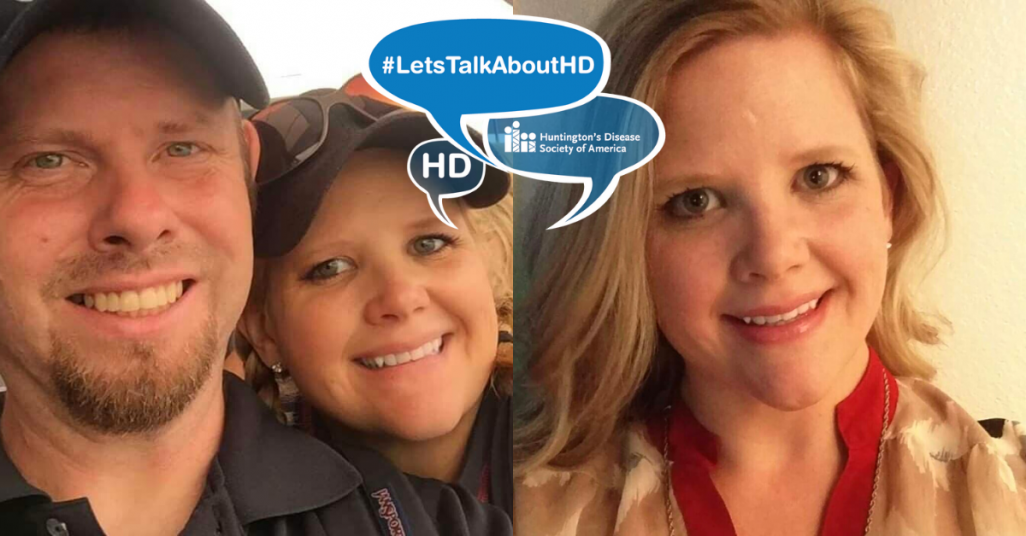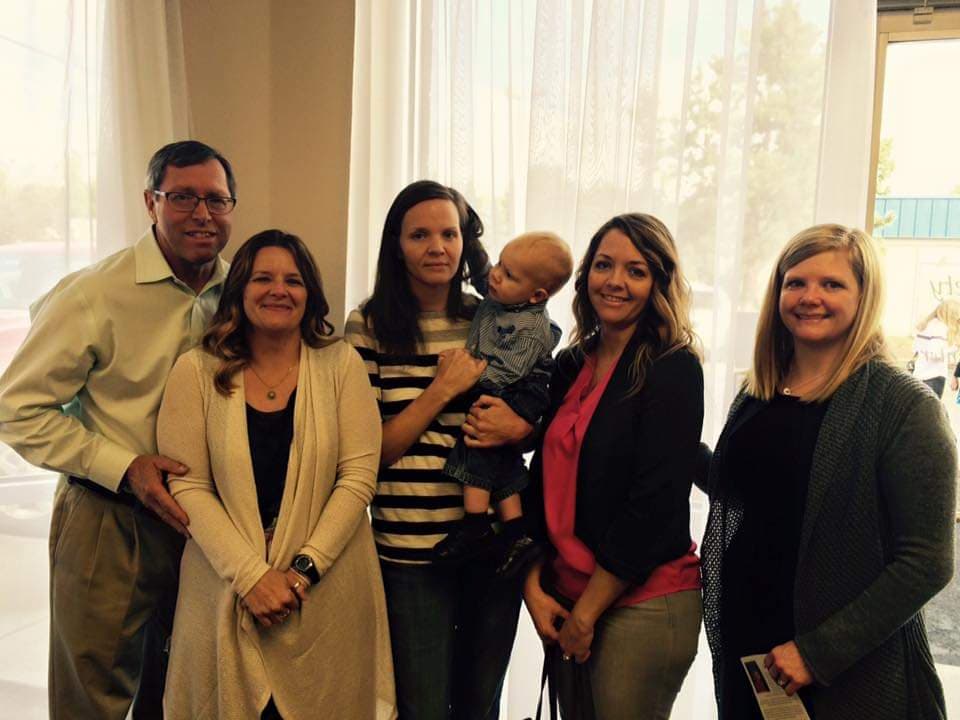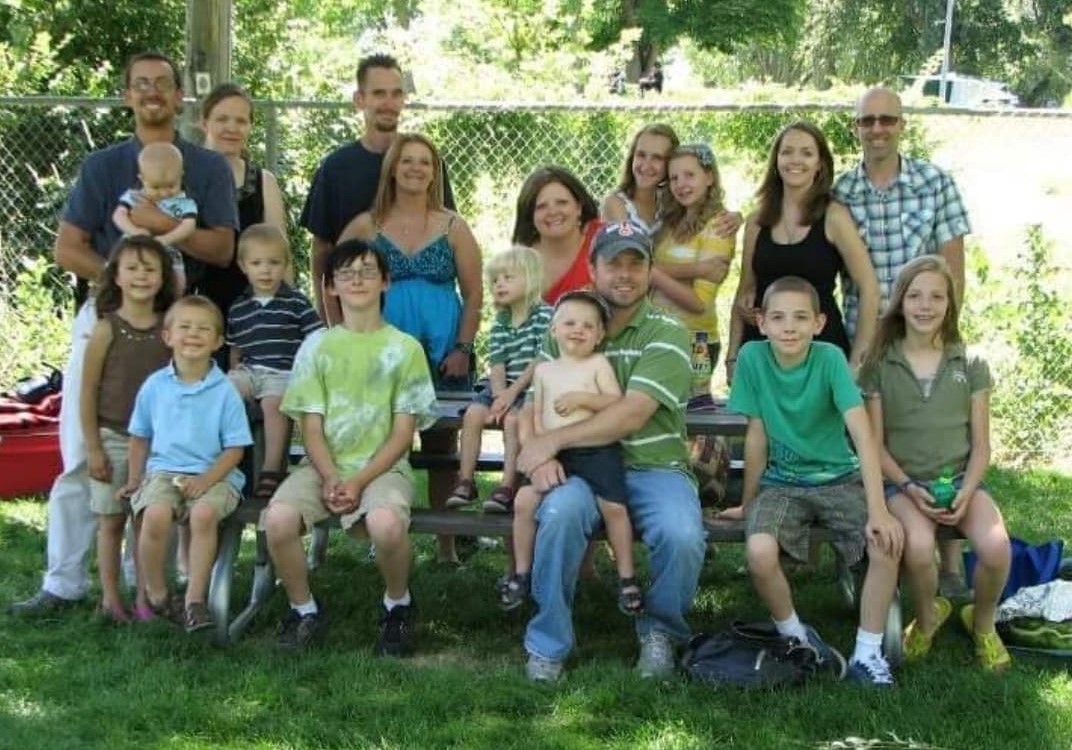
By Matthew Santamaria (msantamaria@hdsa.org)
Growing up, Idaho resident Catherine Payton was only raised by her mother and not her biological father. At 28-years-old, Catherine met her father.
Once she met him, Catherine knew there was something off about her father. She thought that he had Parkinson’s disease. Before he passed away, he tested positive for the gene that causes Huntington’s disease (HD).
HD is a fatal genetic disorder that causes the progressive breakdown of nerve cells in the brain. It deteriorates a person’s physical and mental abilities during their prime working years and has no cure.
According to Catherine, her father’s family did not know about HD. Besides Catherine, her father had four children (all nurses) who were now at risk for HD. Every child of a parent with HD has a 50/50 chance of inheriting the faulty gene.

According to Catherine, her father dealt with personal issues and was unable to take care of himself. The symptoms of HD are described as having ALS, Parkinson’s and Alzheimer’s – simultaneously. Symptoms include personality changes, mood swings, depression, forgetfulness, impaired judgment, unsteady gait, involuntary movements, slurred speech, difficulty in swallowing, and significant weight loss.
In 2015, Catherine’s mother passed away as this was difficult for Catherine to deal with. She suffered with severe depression as well as personality changes. Catherine would later go to rehab after dealing with substance abuse.
She would later move into a new house with her husband. According to Catherine, she started to have tremors and her husband, emergency room nurse, picked up on it as well. She now suffers with chorea which led her to get tested.

The decision to get genetically tested is difficult to make. Each year, 5-10% are tested. It is never the right or wrong decision to be tested. There are people that see no benefit in knowing that they will develop the disease while others want to know in order to make informed choices about their future. It can take up to several weeks to receive your results from the genetic testing center.
Even though Catherine has HD related symptoms, the test came back negative but is currently undergoing different diagnostic testing. According to Catherine, she values the meaning of life even more because of the children and wants as much time with them as she can.
Catherine wants to bring more awareness to HD and serve as a good example for her children, especially when it comes to advocating for a better future.
Without passage of the HD Parity Act, patients with HD will continue to suffer the mandated 2-year waiting period for Medicare benefits after qualifying for Social Security Disability Insurance. To learn more, visit HDSA.ORG/TAKEACTION
“Changes are needed in Congress because two years is too long,” said Catherine. “This is not enough time for it to be helpful.”
###
Huntington’s disease (HD) is a fatal genetic disorder that causes the progressive breakdown of nerve cells in the brain. It deteriorates a person’s physical and mental abilities during their prime working years and has no cure. Every child of a parent with HD has a 50/50 chance of inheriting the faulty gene. Today, there are approximately 41,000 symptomatic Americans and more than 200,000 at-risk of inheriting the disease. The symptoms of HD are described as having ALS, Parkinson’s and Alzheimer’s – simultaneously.
The Huntington’s Disease Society of America is the premier nonprofit organization dedicated to improving the lives of everyone affected by HD. From community services and education to advocacy and research, HDSA is the world’s leader in providing help for today and hope for tomorrow for people with HD and their families.
HDSA was founded in 1967 by Marjorie Guthrie, the wife of legendary folk singer Woody Guthrie. Woody died from HD complications when he was only 55 years old, but the Guthrie family legacy lives on at HDSA to this day.
To learn more about Huntington’s disease and the work of the Huntington’s Disease Society of America, visit www.HDSA.org or call 1(800)345-HDSA.
This is a story featuring a personal experience with Huntington’s disease. If you would like to have your story told please contact Matthew Santamaria at msantamaria@hdsa.org
Growing up, Idaho resident Catherine Payton was only raised by her mother and not her biological father. At 28-years-old, Catherine met her father.
Once she met him, Catherine knew there was something off about her father. She thought that he had Parkinson’s disease. Before he passed away, he tested positive for the gene that causes Huntington’s disease (HD).
HD is a fatal genetic disorder that causes the progressive breakdown of nerve cells in the brain. It deteriorates a person’s physical and mental abilities during their prime working years and has no cure.
According to Catherine, her father’s family did not know about HD. Besides Catherine, her father had four children (all nurses) who were now at risk for HD. Every child of a parent with HD has a 50/50 chance of inheriting the faulty gene.

According to Catherine, her father dealt with personal issues and was unable to take care of himself. The symptoms of HD are described as having ALS, Parkinson’s and Alzheimer’s – simultaneously. Symptoms include personality changes, mood swings, depression, forgetfulness, impaired judgment, unsteady gait, involuntary movements, slurred speech, difficulty in swallowing, and significant weight loss.
In 2015, Catherine’s mother passed away as this was difficult for Catherine to deal with. She suffered with severe depression as well as personality changes. Catherine would later go to rehab after dealing with substance abuse.
She would later move into a new house with her husband. According to Catherine, she started to have tremors and her husband, emergency room nurse, picked up on it as well. She now suffers with chorea which led her to get tested.

The decision to get genetically tested is difficult to make. Each year, 5-10% are tested. It is never the right or wrong decision to be tested. There are people that see no benefit in knowing that they will develop the disease while others want to know in order to make informed choices about their future. It can take up to several weeks to receive your results from the genetic testing center.
Even though Catherine has HD related symptoms, the test came back negative but is currently undergoing different diagnostic testing. According to Catherine, she values the meaning of life even more because of the children and wants as much time with them as she can.
Catherine wants to bring more awareness to HD and serve as a good example for her children, especially when it comes to advocating for a better future.
Without passage of the HD Parity Act, patients with HD will continue to suffer the mandated 2-year waiting period for Medicare benefits after qualifying for Social Security Disability Insurance. To learn more, visit HDSA.ORG/TAKEACTION
“Changes are needed in Congress because two years is too long,” said Catherine. “This is not enough time for it to be helpful.”
Catherine has a message for the HD Community:
“We need to raise awareness to show nobody is alone."
“We need to raise awareness to show nobody is alone."
###
Huntington’s disease (HD) is a fatal genetic disorder that causes the progressive breakdown of nerve cells in the brain. It deteriorates a person’s physical and mental abilities during their prime working years and has no cure. Every child of a parent with HD has a 50/50 chance of inheriting the faulty gene. Today, there are approximately 41,000 symptomatic Americans and more than 200,000 at-risk of inheriting the disease. The symptoms of HD are described as having ALS, Parkinson’s and Alzheimer’s – simultaneously.
The Huntington’s Disease Society of America is the premier nonprofit organization dedicated to improving the lives of everyone affected by HD. From community services and education to advocacy and research, HDSA is the world’s leader in providing help for today and hope for tomorrow for people with HD and their families.
HDSA was founded in 1967 by Marjorie Guthrie, the wife of legendary folk singer Woody Guthrie. Woody died from HD complications when he was only 55 years old, but the Guthrie family legacy lives on at HDSA to this day.
To learn more about Huntington’s disease and the work of the Huntington’s Disease Society of America, visit www.HDSA.org or call 1(800)345-HDSA.
This is a story featuring a personal experience with Huntington’s disease. If you would like to have your story told please contact Matthew Santamaria at msantamaria@hdsa.org
